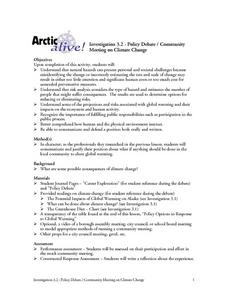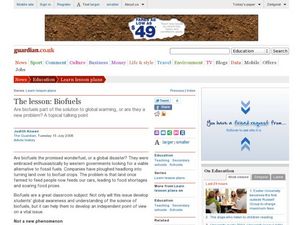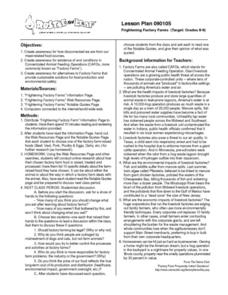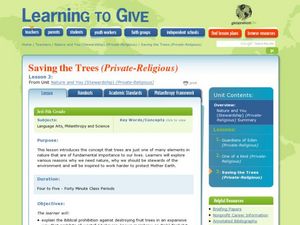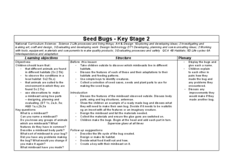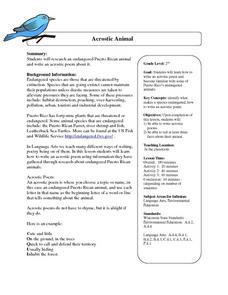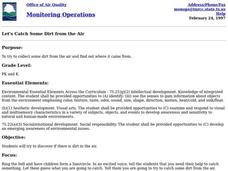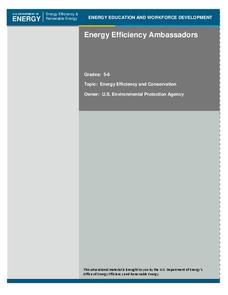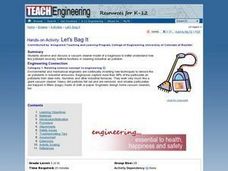Curated OER
Policy Debate / Community Meeting on Climate Change
Students investigate how natural hazards can present personal and societal challenges as well as the cost involved. They assess the risk analysis considerations with global warming and their impacts on an ecosystem. An estimate of the...
Curated OER
The Lesson: Bio-fuels
Students explore the pros and cons of bio-fuel use. In this environmental stewardship activity, students visit selected websites to discover what bio-fuels are and the effect they may have on the environment.
Curated OER
Plants 'R' Us!
Students investigate the interdependencies of plants and animals, and study what a food web is. They create a food web using yarn and images.
Curated OER
Frightening Factory Farms
Students discuss existence of and conditions on factory farms, and identify alternatives to factory farms that provide sustainable solutions for food production and environmental safety.
Curated OER
Laws of Motions
Seventh graders explore the Laws of Motion. They define friction and explain the concept of inertia. Students explain what happens when a force is exerted on an object that is in equilibrium. They state the second and third laws of motion.
Curated OER
Saving the Trees
Students identify why trees are important. In this environmental lesson, students read the book The Giving Tree and list reasons why humans need trees. Students create a storybook to explain why other natural resources are important to...
Curated OER
Seed Bugs; Stage 2
Students examine nature by participating in an environmental art activity. In this imaginary creature lesson, students discuss the importance of a habitat when pertaining to wild animals or bugs. Students utilize tree parts which they...
Curated OER
Mud Splat Craters
Students simulate crater formation using mud. In this earth science instructional activity, students identify the features of a crater. They explain how the force of impact affect the crater's appearance.
Curated OER
Nature And Nurture
Students develop an understanding of the role both nature and nurture play in determining an individual's traits. Using a website, students answer questions about nature and nurture in order to solve the riddle, What do you call a smart...
Curated OER
Illnois River and Lake Mussel Habitat Diorama Activity
Learners identify the environmental elements of river and lake mussels. They compare the elements to the time before settlement and during industrialization. They also participate in a field trip to a mussel exhibit.
Curated OER
Are You Balanced With Your Environment?
Students discuss the impact of not keeping the environment in balance for future generations. As a class, they are introduced to the concept of "Balance of Nature" and what it means. In groups, they research the role of trees and how to...
Curated OER
Acrostic Animal
Second graders listen as the teacher describes how an acrostic poem is written. They research an endangered animal of Puerto Rico. Students write an acrostic poem as a class, and then individually about the animal they research. Students...
Curated OER
Activity #8 Simulation of Oil Spills
Students conduct an experiment to simulate an oil spill and identify the characteristics of oil in water. They evaluate the effectiveness of various cleanup methods. They discuss the how to clean up an oil spill, and what causes oil...
Curated OER
Genetics
Learners explain the difference between dominant and recessive genes, identify what causes differences in the traits of parents and their offspring, and explain how sex is determined. They will also improve their reading and...
Curated OER
Let's Catch Some Dirt From the Air
Students investigate the dirt in the air. In this air quality lesson, students use aluminum foil and petroleum jelly to discover if there is dirt in the air. Students discuss results.
Curated OER
Greenhouse Effect
Students investigate the greenhouse effect. In this environmental lesson, students investigate why the greenhouse effect changes the climate through an experiment. Students use vinegar to simulate how acid damages the environment.
Curated OER
Water and Ice
Students observe what happens to water as it goes from a solid to a liquid. For this exploratory lesson students gain an understanding for the water cycle while working in groups observing what happens to water as it changes...
Curated OER
Energize Your Future
Students consider the positive and negative aspects of alternative energy. In this physical science lesson plan, students consider the sources of energy they use everyday. Students compare alternative sources of energy and...
Curated OER
Energy Efficiency Ambassadors
Students consider how to cut their energy use. In this physical science lesson, students investigate the connections between energy use and climate changes. Students compute the actual electrical energy consumption of 2 bulbs and...
Curated OER
The Moon
Students design and build an ideal lunar settlement. In this astronomy lesson plan, students identify the key features of the moon. They compare its environmental condition with the Earth's.
Curated OER
Forest Activity: Forest Layers
Learners examine the forest layers and types of forests. They explore a website, read content on forest layers and the effects of environmental conditions, sumarize the characteristics of a forest type and present the information to the...
Curated OER
Don't Use it All Up
Students observe the way that a sponge absorbs liquids and discuss how we our use of natural resources affects the environment around us. They discuss the need to conserve resources so we don't run out of what we need.
Curated OER
Let's Bag It
Students observe and discuss a vacuum cleaner model of a baghouse to better understand how this pollutant recovery method functions in cleaning industrial air pollution. They give examples of when the use of a baghouse is appropriate,...
Curated OER
Maintaining Strong Fisheries
Students play a game about the life cycle of a blue crab in order to witness the causes of changes in the crab population and discuss what a resource manager could do to keep a stable crab population. Students then create a game titled...


